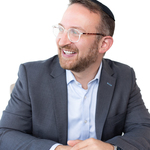One of our core Learning Principles at Kohelet Yeshiva Lab School and Kohelet Yeshiva Middle School is that "Self Reflection Fuels Progress." In educational terms, it refers to the importance of metacognition in the learning process. Like all other cognitive tasks, however, metacognition or self-reflection is not something we can simply ask students to do and hope for the best. It needs to be taught, practiced, and applied - and then the cycle needs to be repeated again.
So every year around this time we dig deep into these lessons with our Middle School students as they begin a several week period of reflection leading up to their Student Led Conferences. While SLC's are an important vehicle for communicating student progress to parents, we remind parents each year that the primary beneficiary of the SLC is the student. Learning to reflect on their successes and failures, to identify and articulate their strengths and weakness, and to set self-improvement goals are skills that will help them immeasurably in every facet of life.
This year our focus is on effective reflection vs. ineffective reflection. We started a recent lesson by watching this Ted Talk by Dr. Tasha Eurich and discussing it together. In it, Dr. Eurich argues that in the search for self-awareness, "why" questions have the propensity to get us stuck, while "what" questions tend to propel us forward.
I then asked our students to fold a piece of paper in half lengthwise and to write the word "why" on one side and "what" on the other. Underneath, I asked them to draw an empty box. I then gave them a few minutes to draw some sort of representation of getting stuck in the box under the word "why" and some representation of moving forward under the word "what." When they had done so, I challenged them to spend ten minutes thinking about their experience in school - as a learner, as a student, and as a friend - and identify as many "why" questions (i.e., questions that have a high probability of getting them stuck) and "what" questions (i.e., questions that would likely move them forward) as they could. I then asked them to share what they came up with with the person sitting next to them and asked them, together, to make a new list of the questions they thought were the best. Lastly, asked them to share their new combined list with the entire class.
What they came up with - completely on their own - was nothing short of breathtaking. Here are but a few examples:
| Why | What |
| Why can't I get good grades? | What can I do to motivate myself? |
| Why don't I have any friends? | What can I do to get better? |
| Why am I bad at everything? | What is a way to make friends? |
| Why can't I focus? | What should I do to help me focus? |
| Why can't I master this? | What will help me improve? |
| Why did that make me mad? | What is a way to solve this problem? |
| Why am I like this? | What is good about me like this? |
| Why am I such a bad friend? | What is something I did that was nice to a friend? |
| Why did he do that? | What can I do to fix the problem? |
| Why can't I learn this? | What can I do to help me absorb knowledge? |
| Why don't I feel like I belong / fit in? | What friends can I count on? |
| Why do I put down my friends sometimes? | What things lift up and help my friends? |
| Why am I always late to school? | What can I do to make sure I'm on time? |
| Why am I lazy? | What intrigues me? |
| Why am I bad at school? | What bores me? |
| Why did she get mad at me? | What did I do that cause her to get mad? |
| What can't I solve this? | What are the steps to this problem? |
| Why did I mess up? | What step got me confused? |
| Why did I listen to that person? | What did I do and what should I have done? |



Now our objective is to have them follow through with asking their "what"s instead of their "why"s and to see just how far it can take them.
CEO of the Ades Family Foundation. Founding Head of School of the Jewish Leadership Academy. Fascinated with the Jewish future.
